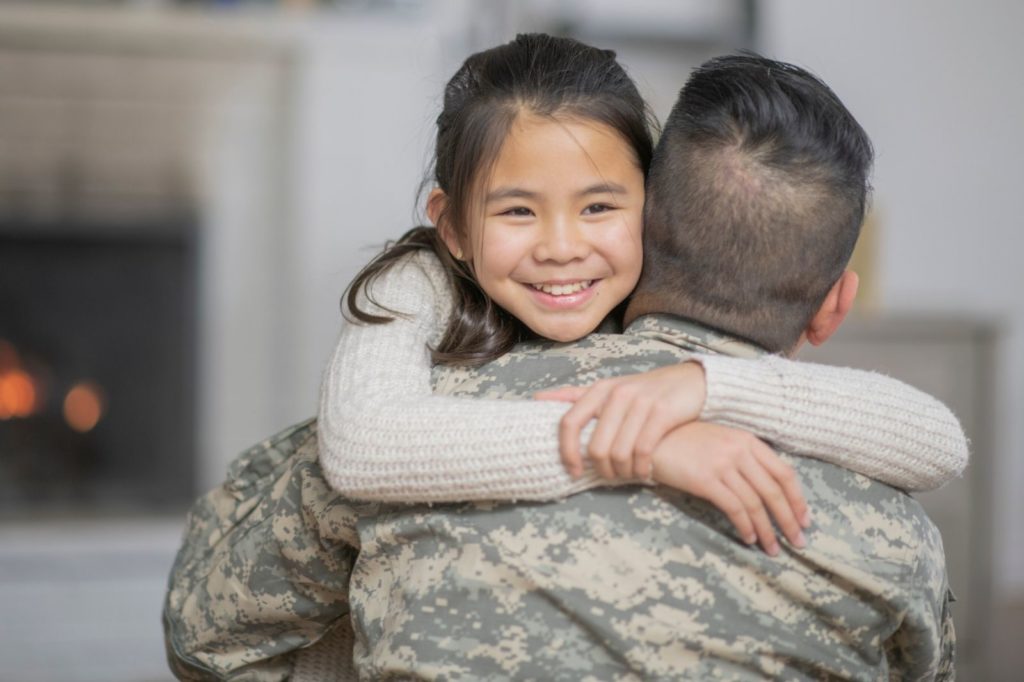In military families, deployment is a fact of life. Since 2001, more than 2 million children in the U.S. have had a parent deployed at least once. Close to half of those have experienced deployments of one or even both parents multiple times.[i]
A parent’s deployment can bring up a lot of stress for families. In a two-parent household, deployment means a change to a single-parent structure, with all the economic and social pressure that comes with that.
When a parent is deployed, the child often finds him/herself taking on new roles in the family:
- Caring for younger siblings
- Taking on more household chores
- Shouldering more responsibility for their own well-being
They are also likely to feel anxious about the deployed parent’s safety. All of this can lead the child to question his/her own basic safety, explains Dr. Joshua Essery, one of the licensed psychologists at Clarity Child Guidance Center.
“If we don’t feel safe, if we don’t know that those who are close to us are going to be safe, it brings up all kinds of questions and feelings that make it hard for us just to go on about our lives smoothly,” Dr. Essery explains.
Signs of stress to watch for in your child
Every child is unique and shows different responses to stress. It’s important to watch for any changes in behavior or personality that might indicate your child is suffering from the stress of deployment. Look for things like:
- Increased irritability or tearfulness
- An increase in hyperactive behavior
- Backsliding on self-care tasks that they’ve previously mastered
- Poor performance at school
- Most importantly, watch for signs that your child is becoming withdrawn or isolated. The child might not want to talk to the deployed parent when they have the chance. Or, they might not want to talk to the parent left at home.
How parents can help children deal with deployment stress
Even for adults, it’s hard to handle others’ difficult emotions or behavior when we are under stress. We want our kids to be okay, and we want to make things better, but sometimes that can get in the way of actually helping.
You can help your child deal with the stress with honest, open communication:
- Tell your child that feelings are okay. Encourage them to talk about how they feel.
- Validate their feelings. Tell them you understand why they are upset.
- If your child asks, share your own feelings about the deployment. Just be careful not to overshare your anxieties and concerns; this can make their anxiety worse.
- Engage your child with problem-solving. Ask them how you can help, or how the situation could be made better.
- Set up rituals or routines to stay connected to the deployed parent.
- Support your child by talking about a larger sense of meaning and purpose. Help them understand why the parent is deployed. Talk about how the work they are serving or helping. Talk about the good things the parent is doing while they are away.
When to seek mental health counseling for your child
“If you find your child is still struggling to communicate openly, mental health professionals are specifically trained to not only help your child talk more and communicate more openly, but to help you understand what’s going on inside your child,” Dr. Essery notes.
Simple steps to getting the process started:
- Contact your insurance company for a list of providers.
- Talk to potential providers to see who might be a good match. It’s important that you can trust your provider, and establish a good relationship with them for both you and your child.
There’s an added benefit to this approach. Talking to a mental health professional helps ease the immediate crisis. And it can be a growth experience that turns into life-benefits for the family and the child.
If you would like to hear the entire interview with Dr. Joshua Essery click here. For a more extensive presentation on How children of active military duty thrive, by Aisha Woods, LPC, please click here.
In case of a medical emergency, please call 911. For a child’s mental health emergency (ages 3 to 17), call Clarity Child Guidance Center at 210-582-6412. Our crisis service department accepts walk-ins 24/7. You can find directions to our campus here. Please do not hesitate to reach out to us. We are here to help!
[i] “11 Facts about Military Families,” Retrieved from DoSomething.org on March 29, 2017.
This blog was created thanks to the generous support of USAA.










